|
|
|
Sort Order |
|
|
|
Items / Page
|
|
|
|
|
|
|
| Srl | Item |
| 1 |
ID:
129985
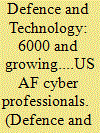

|
|
|
| 2 |
ID:
133611
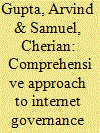

|
|
|
|
|
| Publication |
2014.
|
| Summary/Abstract |
The pressing issues around cyberspace revolve around internet governance, cybersecurity and drawing up rules of the road for the new domain of cyberwar. While each of these is at a different stage in its evolution cycle, cyberspace itself is facing a watershed moment as insecurities mount. The fragmentation of cyberspace seems inevitable unless there is accelerated movement on resolving the fundamental issues of internet governance and cybersecurity that have been hanging fire for well over a decade.
|
|
|
|
|
|
|
|
|
|
|
|
|
|
|
|
| 3 |
ID:
138650
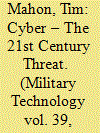

|
|
|
| 4 |
ID:
133609
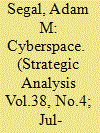

|
|
|
|
|
| Publication |
2014.
|
| Summary/Abstract |
In June 2013, President Obama met with President Xi Jinping at Sunnylands, California. The meeting was seen as a chance for the two leaders to get to know each other in a relatively informal setting so they could address the growing mistrust between their countries. While maritime disputes, trade tensions and differences over how to contain the North Korean and Iranian nuclear programmes were high on the agenda, cyber security-in particular Chinese cyber espionage-was the defining issue of this unusual summit. For the US, the meeting between the two presidents was the culmination of a long campaign to pressure Beijing to reduce the scope and scale of Chinese cyber attacks on the United States.
|
|
|
|
|
|
|
|
|
|
|
|
|
|
|
|
| 5 |
ID:
133610
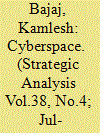

|
|
|
|
|
| Publication |
2014.
|
| Summary/Abstract |
Just as the world was beginning to understand the various dimensions of cyberspace in general, and internet governance in particular, it received the rude shock of the Snowden revelations about the global surveillance carried out by the United States National Security Agency (NSA) in the name of counterterrorism. All kinds of electronic communications of US citizens and non-citizens alike were monitored. Phone tapping and electronic interception were part of this huge operation to collect a haystack of data in the hope of detecting terrorist links to protect national security. The stories that are emerging from the NSA documents made available by Edward Snowden since June 2013 in the Guardian, the New York Times, Der Spiegel and the Washington Post continue to surprise, enrage or shame people depending upon the nation or group that they belong to. The whole world, including those who work for spy agencies, is surprised at the enormity of the scale of surveillance.
|
|
|
|
|
|
|
|
|
|
|
|
|
|
|
|
| 6 |
ID:
132805
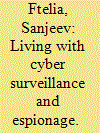

|
|
|
|
|
| Publication |
2014.
|
| Summary/Abstract |
Surveillance and espionage have existed for time immemorial. While they were always a part of any military campaign and study, private lives of ordinary citizens were generally not much affected by such activities. Things are not the same anymore. With the internet invading into our lives like never before, we today live under constant surveillance of multiple agencies like the government, your employer and perhaps your friends and neighbours. While a lot has been written and spoken about surveillance using land, sea, air and space, not much is heard about the surveillance using the fifth domain - the cyber space.
|
|
|
|
|
|
|
|
|
|
|
|
|
|
|
|
| 7 |
ID:
125249
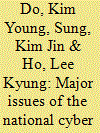

|
|
|
|
|
| Publication |
2013.
|
| Summary/Abstract |
the national cyber security system (NCSS) of South Korea came under criticism when North Korean cyber terrorist attacked the office computers and servers of major south Korean broadcasting and financial companies on March 20, 2013. The NCSS had evolved up to that time by addressing problems, that arose from incidents dating to the January 25, 2003, internet crisis, the March 4, 2011 distributed denial of service (DDoS) crisis, and other event occurring between those attacks. The above 2013 cyber terrorism incident magnified the limits of NCSS leadership, expertise and collaborative systems, while revealing that past reform were nothing more than stopgap measures.
|
|
|
|
|
|
|
|
|
|
|
|
|
|
|
|
| 8 |
ID:
133608
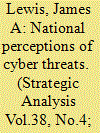

|
|
|
|
|
| Publication |
2014.
|
| Summary/Abstract |
The issue of cybersecurity as an issue for international security has captured the attention of policy makers around the world. A 2011 United Nations (UN) assessment found that only 68 of the 193 UN member states had cybersecurity programmes. By 2012, this had increased to 114 countries. Of the nations with cybersecurity programmes, roughly 40 have publicly identified cybersecurity as a military concern in national military strategies or defence white papers.
|
|
|
|
|
|
|
|
|
|
|
|
|
|
|
|
| 9 |
ID:
132590
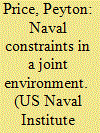

|
|
|
|
|
| Publication |
2014.
|
| Summary/Abstract |
Information system for the navy need to be created keeping in mind that a deployed aircraft, ship, or submarine does not have immediate or sustained support from a shore-based command. Thus, the author says that 'A central controlling agency such as DISA would not be able to effectively operate from these independent-warfare platforms." Here, operations specialist second class Chelsea Ashley monitors an automated information system on the bridge of the guided-missile destroyer USS Donald Cook to track nearby contacts.
|
|
|
|
|
|
|
|
|
|
|
|
|
|
|
|
| 10 |
ID:
122056
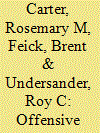

|
|
|
| 11 |
ID:
133727
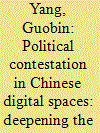

|
|
|
|
|
| Publication |
2014.
|
| Summary/Abstract |
Although research on the Chinese Internet is thriving, our understanding of its multidimensional character, its diverse forms, actors, and dynamics remains limited. This is due to a tendency to focus on technology at the expense of meaning and people, as well as a bias towards sweeping and dichotomous analytical categories, such as state vs. netizens, politics vs. entertainment, and authoritarianism vs. democracy. One of the perniciously appealing ways of sensationalizing the Chinese Internet falls under this either/or dichotomy. The seven contributions in this special issue of China Information challenge such binaries, thus deepening the critical inquiry into the multiple dimensions of the Chinese Internet. The authors show a more complex and nuanced picture of actors and contestation in Chinese digital spaces, as well as the symbolic forms and consequences of these contestations, illuminating new meanings of the political and new dimensions of digital contestation, including race, class and their interactions with the nation. Together, these articles exemplify an analytical orientation that I refer to as 'deep Internet studies'. They explore the Internet as a facet of a deep China by linking it to people's practical, perceptual, and moral experiences as well as to the contexts of institutions, politics, and policies.
|
|
|
|
|
|
|
|
|
|
|
|
|
|
|
|
| 12 |
ID:
108865
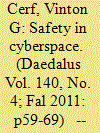

|
|
|
|
|
| Publication |
2011.
|
| Summary/Abstract |
Safety in cyberspace continues to be an elusive objective. This essay explores various metaphors to aid thinking about the means by which safety might be increased. Notions such as cyber-fire-departments or cyber-police-departments as well as models drawn from public health scenarios are considered. The legal frameworks in which safety can be improved and international agreements adopted toward this end are briefly discussed. Users can also contribute to their own safety by adopting various practices that reduce vulnerability to cyber-infection and compromise.
|
|
|
|
|
|
|
|
|
|
|
|
|
|
|
|
| 13 |
ID:
119010
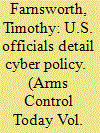

|
|
|
| 14 |
ID:
132818
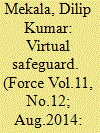

|
|
|
|
|
| Publication |
2014.
|
| Summary/Abstract |
In the backdrop of high expectations set by Narendra Modi before the General Elections, the government's inaction in the field of cyber security seems to be extremely disappointing. It is no secret that India has been far behind in enforcing a comprehensive policy related to cyber security. Last year, the National Cyber Security Policy was released by the then UPA government which listed a broad overview of the plan of action, but it failed to provide the roadmap for implementation. All eyes are now on the National Security Advisor Ajit Doval to see how he would deal with the issue.
|
|
|
|
|
|
|
|
|
|
|
|
|
|
|
|
|
|
|
|
|